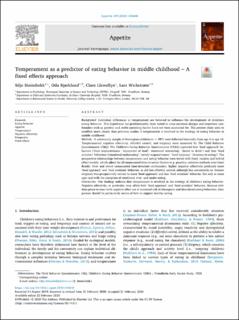| dc.description.abstract | Background
Individual differences in temperament are believed to influence the development of children's eating behavior. This hypothesis has predominantly been tested in cross-sectional designs and important confounders such as genetics and stable parenting factors have not been accounted for. The present study aims to establish more clearly than previous studies if temperament is involved in the etiology of eating behavior in middle childhood.
Methods
A community sample of Norwegian children (n = 997) were followed biennially from age 4 to age 10. Temperamental negative affectivity, effortful control, and surgency were measured by The Child Behavior Questionnaire (CBQ). The Children's Eating Behavior Questionnaire (CEBQ) captured four ‘food approach’ behaviors (‘food responsiveness’, ‘enjoyment of food’, ‘emotional overeating’, ‘desire to drink’) and four ‘food avoidant’ behaviors (‘emotional undereating’, ‘satiety responsiveness’, ‘food fussiness’, ‘slowness in eating’). The prospective relationships between temperament and eating behavior were tested with fixed, random and hybrid effect models, which adjust for all unmeasured time-invariant factors (e.g. genetics, common methods over time)
Results
Over and above unmeasured time-invariant confounders, higher negative affectivity predicted more ‘food approach’ and ‘food avoidant’ behavior, as did low effortful control, although less consistently so. Greater surgency was prospectively related to more ‘food approach’ and less ‘food avoidant’ behavior, but only at some ages and with the exception of emotional over- and under-eating.
Conclusions
Our findings indicate that temperament is involved in the etiology of children's eating behavior. Negative affectivity, in particular, may affect both ‘food approach’ and ‘food avoidant’ behavior. Because children prone to react with negative affect are at increased risk of obesogenic and disordered eating behaviors, their parents should be particularly aware of how to support healthy eating. | en_US |

